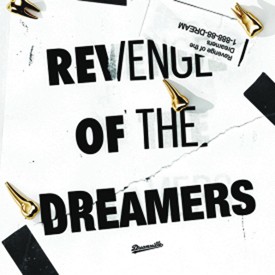Last month North Carolina rapper J. Cole released his fourth official mixtape, Revenge of the Dreamers, to celebrate the launch of his record label, Dreamville Records, reaching a partnership with Interscope Records.
Advertised as a J. Cole solo mixtape, the 11-track project is actually a collaborative effort from Cole and fellow Dreamville artists Bas and Omen. A focused effort from him and his team, the project is a return to form for Cole.
After a short snippet of a track where Cole raps over an interpolation of the instrumental from Tupac’s “Ambition Az A Ridah,” the mixtape kicks off with tracks from Bas and Omen, respectively. The junior statesmen of Cole’s label use a familiar Dreamville formula of deep, brooding production punctuated by agile lyricism. Bas plots his attack on the rap game on “Golden Goals” and Omen confesses his latest insecurities and regrets on “Motion Picture.”
Next is the standout track from Bas’ 2013 mixtape Quarter Water Raised Me Vol. II, “Lit,” which features Cole and Dreamville associate KQuick. Bas and Cole ride a smooth Miguel sample courtesy of producer Ced, Bas telling the tale of his courtship of a centerfold, Cole reflecting on his past and his journey through life.
Five songs in, Cole fans finally get what they’ve been waiting for on “Revenge of the Dreamers.” The mixtape’s title track recalls classic Cole from his Warm Up and Friday Night Lights days. Cole is witty, introspective and unapologetic throughout, declaring, “Got what you want, I got what you need, my heart on my sleeve, watch me bleed. Dreamville is the team, my team iller than fiends, and you ain’t real as you seem.” The instrumental couples a punchy piano sample with stripped-down, boom-bap percussion, reminiscent of his earlier work.
Perhaps the most interesting song on the tape is the final track, the original recording of “Crooked Smile.” A different version shipped on Cole’s 2013 Born Sinner album and peaked at No. 4 on the U.S. rap charts. That version features a sugary piano beat and poppy chorus from TLC. The song’s original incarnation, however, interpolates another Tupac beat, “Str8 Ballin,” and has no hook. Furthermore, the album version’s second and third verses aim to empower listeners to be themselves and embrace their flaws. Though a commendable sentiment, it is cliché. The verses on the mixtape version are anecdotes from Cole’s youth when he was teased for having bad teeth — a real example of being true to himself.
“Crooked Smile,” in its two vastly different manifestations, epitomizes J. Cole’s internal struggle to balance commercial appeal and integrity with his roots.
Cole’s message has remained the same throughout his transition from unsigned hype to Jay-Z protégé, but his sound hasn’t quite discovered itself. Though the quality of his rhymes rarely wavers, the glossy overproduced sound of his albums feels forced and inauthentic. Revenge of the Dreamers brings back the sound that made Cole one of the most respected names in the underground.









